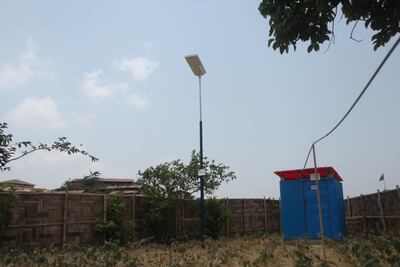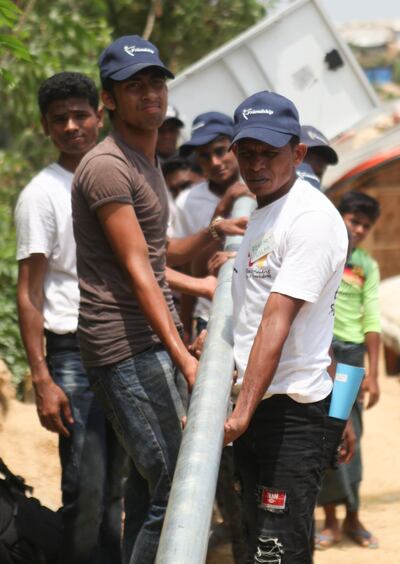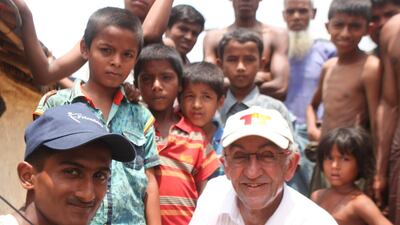Rohingya refugees have known only darkness for years, but finally many have a chance to step into the light thanks to a UAE-backed initiative.
In August 2017, hundreds of thousands of the Muslim-minority group were forced to flee their homes in Myanmar amid a brutal campaign of violence branded as ethnic cleansing and possible genocide by the United Nations.
A military-led crackdown in the predominantly Buddhist country resulted in villages being razed and a death toll that ran into the thousands.
Roughly one million displaced families are thought to have sought sanctuary in Bangladesh, with large numbers settling in camps in Cox's Bazar, in the south of the country.

While they escaped bloodshed and widespread persecution, danger still lurked in the shadows.
Due to a lack of street lights at the camp, many women found themselves prone to abuse and attacks when stepping outside their tents in the dark.
However, since March, those at camp started to see light emerge from the dark.
Dozens of solar street lamps were installed by Sunna Design, a French company which was among the winners at last year's Zayed Sustainability Prize, an international award to inspire renewable energy projects in the name of the nation’s founding father, Sheikh Zayed.
“There was pitch dark, no light in the street at all,” said Thomas Samuel, founder and president of Sunna Design.
“The darkness was mostly affecting security at the camp. It was very hard for people to go out at night especially women. They had accidents when they went out.
“In Bangladesh the sun sets at roughly 6pm, and it is something that we have forgotten to be concerned about living in developed countries. But where there is no street lighting, the feeling of security is gone.”
Sunna Design collaborated with non-governmental organisation Electricians Without Borders to launch the project, Light for the Rohingyas.
A total of 75 lampposts were used to light the streets surrounding 1,500 accommodations inhabited by 8,000 people.
“Our strategy was to finance the pilot to demonstrate the impact and benefits for people in strategic places, and we are hoping that other parties will step in and continue [the project].”
A dozen Rohingya refugees, along with another 12 Bangladeshi locals living near the camp, were trained to install the lampposts and maintain and repair them to ensure long term benefits.
“When they install the lamps themselves, they know where to put them and will be able to take care of them,” said Mr Samuel.
Providing this technical training for the refugees also provides them with a potential source of income.
Mr Samuel said they avoided hiring a foreign or local company to do it, because they could pay the refugees instead to do it. And with their new acquired skills they would hopefully secure jobs in such fields in the future.

Similar projects conducted at other refugee camps over the past two years applied the same model.
Sunna Design has also contributed to similar projects in refugee camps around the world, including Cameroon, Kenya, Rwanda, Jordan and Senegal.
Before winning the prize, Sunna Design provided the solar street lights as a service.
“We were paid by the client, but after winning the prize we have the means to donate the lights.”
They donated eight of the 75 lampposts that were provided to Light for the Rohingyas.
Electricians Without Borders have also been nominated for the latest edition of the Zayed Sustainability Prize, the results of which will be announced in January.


